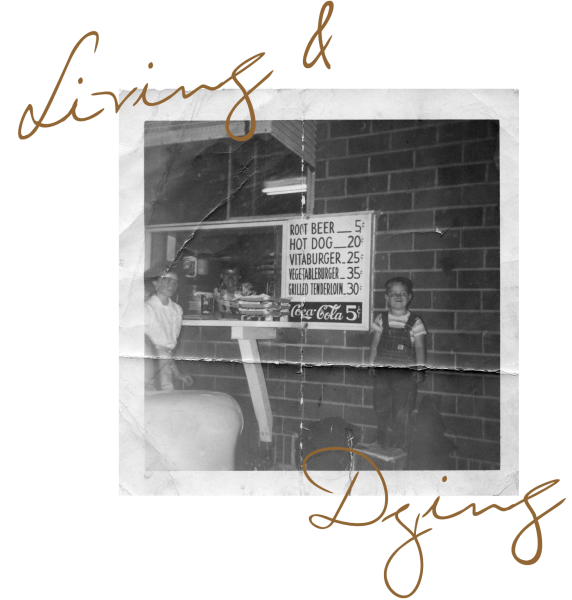There are only two kinds of people in the end: those who say to God, “Thy will be done,” and those to whom God says, in the end, “Thy will be done.” All that are in Hell choose it. Without that self-choice there could be no Hell. No soul that seriously and constantly desires joy will ever miss it.
C. S. Lewis
Eternal Life
Compared to the days when I was a young lad, growing up under the tutelage of my parents in the Midwest, summer today is more of an indoor, rather than outdoor sport. Missing are many of the sounds and smells of a humid summer afternoon and evening because many of us are now wrapped in an air-conditioned cocoon of cool, dry comfort—more comfortable indeed, but also more sterile.
There certainly were air conditioners back in the fifties and sixties of the previous century, but fewer of us had them in our homes. And if we did, it was probably one of those noisy models hung through a window belching icicles up close, but barely improving the temperature in more than one or two contiguous rooms of the house.
No, back in the day we typically experienced summer with windows and doors flung wide to permit even the slightest breeze through the house. And if that were not sufficient, then we added a fan. (In the Sunday church services it would be fans of the cardboard variety supplied by the local funeral home.)
For many born and raised in the U. S. Midwest one of the more nostalgic voices in the summer chorus is that of the cicada. It is utterly illogical, but true, that the sound of an ugly brown insect on humid summer days should so fill the mind and heart with rich memories of one’s youth. The metallic, buzzing rise and fall of the cicada is the sound of humid summer evenings, the smell of charcoal and hot dogs and grilling hamburgers. It is a sound that reminds us that once we were young, and back then it didn’t bother us that we hadn’t air conditioning. It reminds us of the way the house smelled on a sticky August afternoon when Mom was canning pickles.
But the humble cicada also reminds us of something considerably less warm and inviting.
Cicadas have a remarkable life-cycle. Most of their life—often more than a decade—is spent underground. In fact one type of cicada is known as the “17-year locust” (although it is not a locust at all) because it spends seventeen years under ground before emerging to mate and then die.
After seventeen years of living and maturing under ground while they survive by feeding on the sap of tree roots, thousands of nymphs finally emerge, climb up the tree and secure themselves. As they molt, the adult cicada emerges from the nymphal case, dries in a few hours, mates, then feeds for a month until he or she dies.
The female will deposit as many as six hundred eggs in slits she cuts in tree twigs. When the nymphs hatch about six weeks later, they drop to the ground, burrow down a few centimeters, and begin their generation’s seventeen-year life buried in the soil.
Ugly brown things with beady red eyes, the cicadas sing their monotonous drone to attract a mate. Then, with nothing better to do after their fleeting moment of conjugal bliss, they munch their days away, waiting to die. After seventeen years buried in the dank recesses of the earth, they enjoy thirty days of fresh air and freedom—then they die.
There is no better illustration of fallen man’s condition and fate than the humble cicada. For those who do not know Christ, what is living, after all, except years of dwelling in the muck and mire of the earth—then you die. Except that in this, even the lowly cicada enjoys an advantage over the lost. At least the insect dies into nothingness; the one who is lost dies into eternal torment.
[Jesus said,] “Again, the kingdom of heaven is like a dragnet cast into the sea, and gathering fish of every kind; and when it was filled, they drew it up on the beach; and they sat down and gathered the good fish into containers, but the bad they threw away. So it will be at the end of the age; the angels will come forth and take out the wicked from among the righteous, and will throw them into the furnace of fire; in that place there will be weeping and gnashing of teeth.”
Matthew 13:47-50
In contrast to the unbeliever, this world for the Christian is not at all a period of meaningless drudgery ending in an eternity in the dank recesses of despair. The Christian does not spend his earthly days as a prisoner of the soil, day after day sucking thin nourishment from the roots of despair. For the believer this world is an imperfect but suitable platform of praise to our Savior. No longer joined to the soil, we rise above it with uplifted hands and hearts, reaching for the One who has given us, by His grace alone, eternal life with Him.
Thus the inevitable day when we leave the soil of this earth—the day of death, or later, of resurrection—need not be something to dread. For the Christian, what is death, after all, but a simple graduation from long-distance to person-to-person praise. For those who are lost, however, death is the gateway into an eternity in the fiery lake of torment and despair.
Thomas said to Him, “Lord, we do not know where You are going, how do we know the way?” Jesus said to him, “I am the way, and the truth, and the life; no one comes to the Father but through Me.”
John 14:5-6
Issue #868, August 2022.
Reflections by the Pond is published monthly at dlampel.com and is © 2022 David S. Lampel. Unless otherwise indicated, all Scripture is from the New American Standard Bible (Updated Edition). This and all of our resources are offered free-of-charge to the glory and praise of Christ our Lord.



